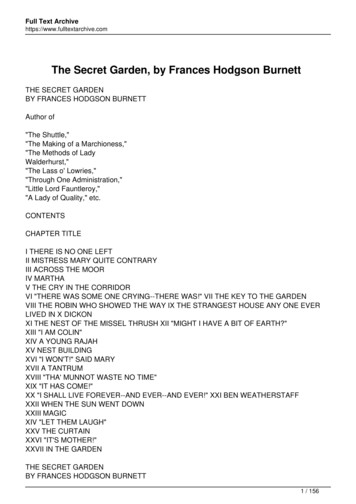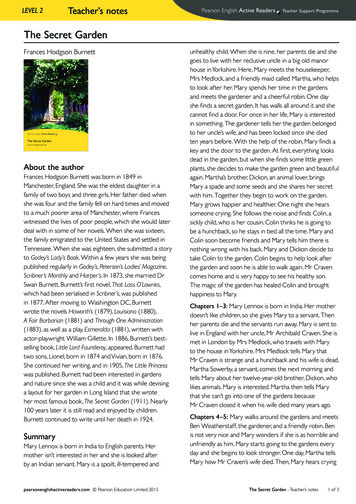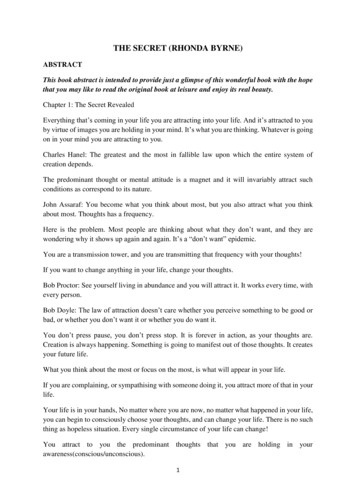
Transcription
Full Text Archivehttps://www.fulltextarchive.comThe Secret Garden, by Frances Hodgson BurnettTHE SECRET GARDENBY FRANCES HODGSON BURNETTAuthor of"The Shuttle,""The Making of a Marchioness,""The Methods of LadyWalderhurst,""The Lass o' Lowries,""Through One Administration,""Little Lord Fauntleroy,""A Lady of Quality," etc.CONTENTSCHAPTER TITLEI THERE IS NO ONE LEFTII MISTRESS MARY QUITE CONTRARYIII ACROSS THE MOORIV MARTHAV THE CRY IN THE CORRIDORVI "THERE WAS SOME ONE CRYING--THERE WAS!" VII THE KEY TO THE GARDENVIII THE ROBIN WHO SHOWED THE WAY IX THE STRANGEST HOUSE ANY ONE EVERLIVED IN X DICKONXI THE NEST OF THE MISSEL THRUSH XII "MIGHT I HAVE A BIT OF EARTH?"XIII "I AM COLIN"XIV A YOUNG RAJAHXV NEST BUILDINGXVI "I WON'T!" SAID MARYXVII A TANTRUMXVIII "THA' MUNNOT WASTE NO TIME"XIX "IT HAS COME!"XX "I SHALL LIVE FOREVER--AND EVER--AND EVER!" XXI BEN WEATHERSTAFFXXII WHEN THE SUN WENT DOWNXXIII MAGICXIV "LET THEM LAUGH"XXV THE CURTAINXXVI "IT'S MOTHER!"XXVII IN THE GARDENTHE SECRET GARDENBY FRANCES HODGSON BURNETT1 / 156
Full Text Archivehttps://www.fulltextarchive.comCHAPTER ITHERE IS NO ONE LEFTWhen Mary Lennox was sent to Misselthwaite Manor to live with her uncle everybody said shewas the most disagreeable-looking child ever seen. It was true, too. She had a little thin faceand a little thin body, thin light hair and a sour expression. Her hair was yellow, and her facewas yellow because she had been born in India and had always been ill in one way or another.Her father had held a position under the English Government and had always been busy and illhimself, and her mother had been a great beauty who cared only to go to parties and amuseherself with gay people. She had not wanted a little girl at all, and when Mary was born shehanded her over to the care of an Ayah, who was made to understand that if she wished toplease the Mem Sahib she must keep the child out of sight as much as possible. So when shewas a sickly, fretful, ugly little baby she was kept out of the way, and when she became a sickly,fretful, toddling thing she was kept out of the way also. She never remembered seeing familiarlyanything but the dark faces of her Ayah and the other native servants, and as they alwaysobeyed her and gave her her own way in everything, because the Mem Sahib would be angry ifshe was disturbed by her crying, by the time she was six years old she was as tyrannical andselfish a little pig as ever lived. The young English governess who came to teach her to readand write disliked her so much that she gave up her place in three months, and when othergovernesses came to try to fill it they always went away in a shorter time than the first one. So ifMary had not chosen to really want to know how to read books she would never have learnedher letters at all.One frightfully hot morning, when she was about nine years old, she awakened feeling verycross, and she became crosser still when she saw that the servant who stood by her bedsidewas not her Ayah."Why did you come?" she said to the strange woman. "I will not let you stay. Send my Ayah tome."The woman looked frightened, but she only stammered that the Ayah could not come and whenMary threw herself into a passion and beat and kicked her, she looked only more frightened andrepeated that it was not possible for the Ayah to come to Missie Sahib.There was something mysterious in the air that morning. Nothing was done in its regular orderand several of the native servants seemed missing, while those whom Mary saw slunk orhurried about with ashy and scared faces. But no one would tell her anything and her Ayah didnot come. She was actually left alone as the morning went on, and at last she wandered out intothe garden and began to play by herself under a tree near the veranda. She pretended that shewas making a flower-bed, and she stuck big scarlet hibiscus blossoms into little heaps of earth,all the time growing more and more angry and muttering to herself the things she would say andthe names she would call Saidie when she returned."Pig! Pig! Daughter of Pigs!" she said, because to call a native a pig is the worst insult of all.She was grinding her teeth and saying this over and over again when she heard her mothercome out on the veranda with some one. She was with a fair young man and they stood talkingtogether in low strange voices. Mary knew the fair young man who looked like a boy. She had2 / 156
Full Text Archivehttps://www.fulltextarchive.comheard that he was a very young officer who had just come from England. The child stared athim, but she stared most at her mother. She always did this when she had a chance to see her,because the Mem Sahib--Mary used to call her that oftener than anything else--was such a tall,slim, pretty person and wore such lovely clothes. Her hair was like curly silk and she had adelicate little nose which seemed to be disdaining things, and she had large laughing eyes. Allher clothes were thin and floating, and Mary said they were "full of lace." They looked fuller oflace than ever this morning, but her eyes were not laughing at all. They were large and scaredand lifted imploringly to the fair boy officer's face."Is it so very bad? Oh, is it?" Mary heard her say."Awfully," the young man answered in a trembling voice. "Awfully, Mrs. Lennox. You ought tohave gone to the hills two weeks ago."The Mem Sahib wrung her hands."Oh, I know I ought!" she cried. "I only stayed to go to that silly dinner party. What a fool I was!"At that very moment such a loud sound of wailing broke out from the servants' quarters that sheclutched the young man's arm, and Mary stood shivering from head to foot. The wailing grewwilder and wilder. "What is it? What is it?" Mrs. Lennox gasped."Some one has died," answered the boy officer. "You did not say it had broken out among yourservants.""I did not know!" the Mem Sahib cried. "Come with me! Come with me!" and she turned and raninto the house.After that, appalling things happened, and the mysteriousness of the morning was explained toMary. The cholera had broken out in its most fatal form and people were dying like flies. TheAyah had been taken ill in the night, and it was because she had just died that the servants hadwailed in the huts. Before the next day three other servants were dead and others had run awayin terror. There was panic on every side, and dying people in all the bungalows.During the confusion and bewilderment of the second day Mary hid herself in the nursery andwas forgotten by everyone. Nobody thought of her, nobody wanted her, and strange thingshappened of which she knew nothing. Mary alternately cried and slept through the hours. Sheonly knew that people were ill and that she heard mysterious and frightening sounds. Once shecrept into the dining-room and found it empty, though a partly finished meal was on the tableand chairs and plates looked as if they had been hastily pushed back when the diners rosesuddenly for some reason. The child ate some fruit and biscuits, and being thirsty she drank aglass of wine which stood nearly filled. It was sweet, and she did not know how strong it was.Very soon it made her intensely drowsy, and she went back to her nursery and shut herself inagain, frightened by cries she heard in the huts and by the hurrying sound of feet. The winemade her so sleepy that she could scarcely keep her eyes open and she lay down on her bedand knew nothing more for a long time.Many things happened during the hours in which she slept so heavily, but she was not disturbedby the wails and the sound of things being carried in and out of the bungalow.3 / 156
Full Text Archivehttps://www.fulltextarchive.comWhen she awakened she lay and stared at the wall. The house was perfectly still. She hadnever known it to be so silent before. She heard neither voices nor footsteps, and wondered ifeverybody had got well of the cholera and all the trouble was over. She wondered also whowould take care of her now her Ayah was dead. There would be a new Ayah, and perhaps shewould know some new stories. Mary had been rather tired of the old ones. She did not crybecause her nurse had died. She was not an affectionate child and had never cared much forany one. The noise and hurrying about and wailing over the cholera had frightened her, and shehad been angry because no one seemed to remember that she was alive. Everyone was toopanic-stricken to think of a little girl no one was fond of. When people had the cholera it seemedthat they remembered nothing but themselves. But if everyone had got well again, surely someone would remember and come to look for her.But no one came, and as she lay waiting the house seemed to grow more and more silent. Sheheard something rustling on the matting and when she looked down she saw a little snakegliding along and watching her with eyes like jewels. She was not frightened, because he was aharmless little thing who would not hurt her and he seemed in a hurry to get out of the room. Heslipped under the door as she watched him."How queer and quiet it is," she said. "It sounds as if there were no one in the bungalow but meand the snake."Almost the next minute she heard footsteps in the compound, and then on the veranda. Theywere men's footsteps, and the men entered the bungalow and talked in low voices. No one wentto meet or speak to them and they seemed to open doors and look into rooms. "Whatdesolation!" she heard one voice say. "That pretty, pretty woman! I suppose the child, too. Iheard there was a child, though no one ever saw her."Mary was standing in the middle of the nursery when they opened the door a few minutes later.She looked an ugly, cross little thing and was frowning because she was beginning to be hungryand feel disgracefully neglected. The first man who came in was a large officer she had onceseen talking to her father. He looked tired and troubled, but when he saw her he was so startledthat he almost jumped back."Barney!" he cried out. "There is a child here! A child alone! In a place like this! Mercy on us,who is she!""I am Mary Lennox," the little girl said, drawing herself up stiffly. She thought the man was veryrude to call her father's bungalow "A place like this!" "I fell asleep when everyone had thecholera and I have only just wakened up. Why does nobody come?""It is the child no one ever saw!" exclaimed the man, turning to his companions. "She hasactually been forgotten!""Why was I forgotten?" Mary said, stamping her foot. "Why does nobody come?"The young man whose name was Barney looked at her very sadly. Mary even thought she sawhim wink his eyes as if to wink tears away."Poor little kid!" he said. "There is nobody left to come."4 / 156
Full Text Archivehttps://www.fulltextarchive.comIt was in that strange and sudden way that Mary found out that she had neither father normother left; that they had died and been carried away in the night, and that the few nativeservants who had not died also had left the house as quickly as they could get out of it, none ofthem even remembering that there was a Missie Sahib. That was why the place was so quiet. Itwas true that there was no one in the bungalow but herself and the little rustling snake.Chapter IIMISTRESS MARY QUITE CONTRARYMary had liked to look at her mother from a distance and she had thought her very pretty, but asshe knew very little of her she could scarcely have been expected to love her or to miss her verymuch when she was gone. She did not miss her at all, in fact, and as she was a self-absorbedchild she gave her entire thought to herself, as she had always done. If she had been older shewould no doubt have been very anxious at being left alone in the world, but she was veryyoung, and as she had always been taken care of, she supposed she always would be. Whatshe thought was that she would like to know if she was going to nice people, who would bepolite to her and give her her own way as her Ayah and the other native servants had done.She knew that she was not going to stay at the English clergyman's house where she was takenat first. She did not want to stay. The English clergyman was poor and he had five childrennearly all the same age and they wore shabby clothes and were always quarreling andsnatching toys from each other. Mary hated their untidy bungalow and was so disagreeable tothem that after the first day or two nobody would play with her. By the second day they hadgiven her a nickname which made her furious.It was Basil who thought of it first. Basil was a little boy with impudent blue eyes and a turned-upnose, and Mary hated him. She was playing by herself under a tree, just as she had beenplaying the day the cholera broke out. She was making heaps of earth and paths for a gardenand Basil came and stood near to watch her. Presently he got rather interested and suddenlymade a suggestion."Why don't you put a heap of stones there and pretend it is a rockery?" he said. "There in themiddle," and he leaned over her to point."Go away!" cried Mary. "I don't want boys. Go away!"For a moment Basil looked angry, and then he began to tease. He was always teasing hissisters. He danced round and round her and made faces and sang and laughed."Mistress Mary, quite contrary,How does your garden grow?With silver bells, and cockle shells, And marigolds all in a row."He sang it until the other children heard and laughed, too; and the crosser Mary got, the morethey sang "Mistress Mary, quite contrary"; and after that as long as she stayed with them theycalled her "Mistress Mary Quite Contrary" when they spoke of her to each other, and often whenthey spoke to her.5 / 156
Full Text Archivehttps://www.fulltextarchive.com"You are going to be sent home," Basil said to her, "at the end of the week. And we're glad of it.""I am glad of it, too," answered Mary. "Where is home?""She doesn't know where home is!" said Basil, with seven-year-old scorn. "It's England, ofcourse. Our grandmama lives there and our sister Mabel was sent to her last year. You are notgoing to your grandmama. You have none. You are going to your uncle. His name is Mr.Archibald Craven.""I don't know anything about him," snapped Mary."I know you don't," Basil answered. "You don't know anything. Girls never do. I heard father andmother talking about him. He lives in a great, big, desolate old house in the country and no onegoes near him. He's so cross he won't let them, and they wouldn't come if he would let them.He's a hunchback, and he's horrid." "I don't believe you," said Mary; and she turned her backand stuck her fingers in her ears, because she would not listen any more.But she thought over it a great deal afterward; and when Mrs. Crawford told her that night thatshe was going to sail away to England in a few days and go to her uncle, Mr. Archibald Craven,who lived at Misselthwaite Manor, she looked so stony and stubbornly uninterested that they didnot know what to think about her. They tried to be kind to her, but she only turned her face awaywhen Mrs. Crawford attempted to kiss her, and held herself stiffly when Mr. Crawford patted hershoulder."She is such a plain child," Mrs. Crawford said pityingly, afterward. "And her mother was such apretty creature. She had a very pretty manner, too, and Mary has the most unattractive ways Iever saw in a child. The children call her Mistress Mary Quite Contrary,' and though it's naughtyof them, one can't help understanding it.""Perhaps if her mother had carried her pretty face and her pretty manners oftener into thenursery Mary might have learned some pretty ways too. It is very sad, now the poor beautifulthing is gone, to remember that many people never even knew that she had a child at all.""I believe she scarcely ever looked at her," sighed Mrs. Crawford. "When her Ayah was deadthere was no one to give a thought to the little thing. Think of the servants running away andleaving her all alone in that deserted bungalow. Colonel McGrew said he nearly jumped out ofhis skin when he opened the door and found her standing by herself in the middle of the room."Mary made the long voyage to England under the care of an officer's wife, who was taking herchildren to leave them in a boarding-school. She was very much absorbed in her own little boyand girl, and was rather glad to hand the child over to the woman Mr. Archibald Craven sent tomeet her, in London. The woman was his housekeeper at Misselthwaite Manor, and her namewas Mrs. Medlock. She was a stout woman, with very red cheeks and sharp black eyes. Shewore a very purple dress, a black silk mantle with jet fringe on it and a black bonnet with purplevelvet flowers which stuck up and trembled when she moved her head. Mary did not like her atall, but as she very seldom liked people there was nothing remarkable in that; besides which itwas very evident Mrs. Medlock did not think much of her."My word! she's a plain little piece of goods!" she said. "And we'd heard that her mother was a6 / 156
Full Text Archivehttps://www.fulltextarchive.combeauty. She hasn't handed much of it down, has she, ma'am?" "Perhaps she will improve asshe grows older," the officer's wife said good-naturedly. "If she were not so sallow and had anicer expression, her features are rather good. Children alter so much.""She'll have to alter a good deal," answered Mrs. Medlock. "And, there's nothing likely toimprove children at Misselthwaite--if you ask me!" They thought Mary was not listening becauseshe was standing a little apart from them at the window of the private hotel they had gone to.She was watching the passing buses and cabs and people, but she heard quite well and wasmade very curious about her uncle and the place he lived in. What sort of a place was it, andwhat would he be like? What was a hunchback? She had never seen one. Perhaps there werenone in India.Since she had been living in other people's houses and had had no Ayah, she had begun to feellonely and to think queer thoughts which were new to her. She had begun to wonder why shehad never seemed to belong to anyone even when her father and mother had been alive. Otherchildren seemed to belong to their fathers and mothers, but she had never seemed to really beanyone's little girl. She had had servants, and food and clothes, but no one had taken anynotice of her. She did not know that this was because she was a disagreeable child; but then, ofcourse, she did not know she was disagreeable. She often thought that other people were, butshe did not know that she was so herself.She thought Mrs. Medlock the most disagreeable person she had ever seen, with her common,highly colored face and her common fine bonnet. When the next day they set out on theirjourney to Yorkshire, she walked through the station to the railway carriage with her head upand trying to keep as far away from her as she could, because she did not want to seem tobelong to her. It would have made her angry to think people imagined she was her little girl.But Mrs. Medlock was not in the least disturbed by her and her thoughts. She was the kind ofwoman who would "stand no nonsense from young ones." At least, that is what she would havesaid if she had been asked. She had not wanted to go to London just when her sister Maria'sdaughter was going to be married, but she had a comfortable, well paid place as housekeeperat Misselthwaite Manor and the only way in which she could keep it was to do at once what Mr.Archibald Craven told her to do. She never dared even to ask a question."Captain Lennox and his wife died of the cholera," Mr. Craven had said in his short, cold way."Captain Lennox was my wife's brother and I am their daughter's guardian. The child is to bebrought here. You must go to London and bring her yourself."So she packed her small trunk and made the journey.Mary sat in her corner of the railway carriage and looked plain and fretful. She had nothing toread or to look at, and she had folded her thin little black-gloved hands in her lap. Her blackdress made her look yellower than ever, and her limp light hair straggled from under her blackcrepe hat."A more marred-looking young one I never saw in my life," Mrs. Medlock thought. (Marred is aYorkshire word and means spoiled and pettish.) She had never seen a child who sat so stillwithout doing anything; and at last she got tired of watching her and began to talk in a brisk,hard voice.7 / 156
Full Text Archivehttps://www.fulltextarchive.com"I suppose I may as well tell you something about where you are going to," she said. "Do youknow anything about your uncle?""No," said Mary."Never heard your father and mother talk about him?""No," said Mary frowning. She frowned because she remembered that her father and motherhad never talked to her about anything in particular. Certainly they had never told her things."Humph," muttered Mrs. Medlock, staring at her queer, unresponsive little face. She did not sayany more for a few moments and then she began again."I suppose you might as well be told something--to prepare you. You are going to a queerplace."Mary said nothing at all, and Mrs. Medlock looked rather discomfited by her apparentindifference, but, after taking a breath, she went on."Not but that it's a grand big place in a gloomy way, and Mr. Craven's proud of it in his way--andthat's gloomy enough, too. The house is six hundred years old and it's on the edge of the moor,and there's near a hundred rooms in it, though most of them's shut up and locked. And there'spictures and fine old furniture and things that's been there for ages, and there's a big park roundit and gardens and trees with branches trailing to the ground--some of them." She paused andtook another breath. "But there's nothing else," she ended suddenly.Mary had begun to listen in spite of herself. It all sounded so unlike India, and anything newrather attracted her. But she did not intend to look as if she were interested. That was one of herunhappy, disagreeable ways. So she sat still."Well," said Mrs. Medlock. "What do you think of it?""Nothing," she answered. "I know nothing about such places."That made Mrs. Medlock laugh a short sort of laugh."Eh!" she said, "but you are like an old woman. Don't you care?""It doesn't matter" said Mary, "whether I care or not.""You are right enough there," said Mrs. Medlock. "It doesn't. What you're to be kept atMisselthwaite Manor for I don't know, unless because it's the easiest way. He's not going totrouble himself about you, that's sure and certain. He never troubles himself about no one."She stopped herself as if she had just remembered something in time."He's got a crooked back," she said. "That set him wrong. He was a sour young man and got nogood of all his money and big place till he was married."8 / 156
Full Text Archivehttps://www.fulltextarchive.comMary's eyes turned toward her in spite of her intention not to seem to care. She had neverthought of the hunchback's being married and she was a trifle surprised. Mrs. Medlock saw this,and as she was a talkative woman she continued with more interest. This was one way ofpassing some of the time, at any rate."She was a sweet, pretty thing and he'd have walked the world over to get her a blade o' grassshe wanted. Nobody thought she'd marry him, but she did, and people said she married him forhis money. But she didn't--she didn't," positively. "When she died--"Mary gave a little involuntary jump."Oh! did she die!" she exclaimed, quite without meaning to. She had just remembered a Frenchfairy story she had once read called "Riquet a la Houppe." It had been about a poor hunchbackand a beautiful princess and it had made her suddenly sorry for Mr. Archibald Craven."Yes, she died," Mrs. Medlock answered. "And it made him queerer than ever. He cares aboutnobody. He won't see people. Most of the time he goes away, and when he is at Misselthwaitehe shuts himself up in the West Wing and won't let any one but Pitcher see him. Pitcher's an oldfellow, but he took care of him when he was a child and he knows his ways."It sounded like something in a book and it did not make Mary feel cheerful. A house with ahundred rooms, nearly all shut up and with their doors locked--a house on the edge of amoor--whatsoever a moor was--sounded dreary. A man with a crooked back who shut himselfup also! She stared out of the window with her lips pinched together, and it seemed quitenatural that the rain should have begun to pour down in gray slanting lines and splash andstream down the window-panes. If the pretty wife had been alive she might have made thingscheerful by being something like her own mother and by running in and out and going to partiesas she had done in frocks "full of lace." But she was not there any more."You needn't expect to see him, because ten to one you won't," said Mrs. Medlock. "And youmustn't expect that there will be people to talk to you. You'll have to play about and look afteryourself. You'll be told what rooms you can go into and what rooms you're to keep out of.There's gardens enough. But when you're in the house don't go wandering and poking about.Mr. Craven won't have it.""I shall not want to go poking about," said sour little Mary and just as suddenly as she hadbegun to be rather sorry for Mr. Archibald Craven she began to cease to be sorry and to thinkhe was unpleasant enough to deserve all that had happened to him.And she turned her face toward the streaming panes of the window of the railway carriage andgazed out at the gray rain-storm which looked as if it would go on forever and ever. Shewatched it so long and steadily that the grayness grew heavier and heavier before her eyes andshe fell asleep.CHAPTER IIIACROSS THE MOORShe slept a long time, and when she awakened Mrs. Medlock had bought a lunchbasket at one9 / 156
Full Text Archivehttps://www.fulltextarchive.comof the stations and they had some chicken and cold beef and bread and butter and some hottea. The rain seemed to be streaming down more heavily than ever and everybody in the stationwore wet and glistening waterproofs. The guard lighted the lamps in the carriage, and Mrs.Medlock cheered up very much over her tea and chicken and beef. She ate a great deal andafterward fell asleep herself, and Mary sat and stared at her and watched her fine bonnet slip onone side until she herself fell asleep once more in the corner of the carriage, lulled by thesplashing of the rain against the windows. It was quite dark when she awakened again. Thetrain had stopped at a station and Mrs. Medlock was shaking her."You have had a sleep!" she said. "It's time to open your eyes! We're at Thwaite Station andwe've got a long drive before us."Mary stood up and tried to keep her eyes open while Mrs. Medlock collected her parcels. Thelittle girl did not offer to help her, because in India native servants always picked up or carriedthings and it seemed quite proper that other people should wait on one.The station was a small one and nobody but themselves seemed to be getting out of the train.The station-master spoke to Mrs. Medlock in a rough, good-natured way, pronouncing his wordsin a queer broad fashion which Mary found out afterward was Yorkshire."I see tha's got back," he said. "An' tha's browt th' young 'un with thee.""Aye, that's her," answered Mrs. Medlock, speaking with a Yorkshire accent herself and jerkingher head over her shoulder toward Mary. "How's thy Missus?""Well enow. Th' carriage is waitin' outside for thee."A brougham stood on the road before the little outside platform. Mary saw that it was a smartcarriage and that it was a smart footman who helped her in. His long waterproof coat and thewaterproof covering of his hat were shining and dripping with rain as everything was, the burlystation-master included.When he shut the door, mounted the box with the coachman, and they drove off, the little girlfound herself seated in a comfortably cushioned corner, but she was not inclined to go to sleepagain. She sat and looked out of the window, curious to see something of the road over whichshe was being driven to the queer place Mrs. Medlock had spoken of. She was not at all a timidchild and she was not exactly frightened, but she felt that there was no knowing what mighthappen in a house with a hundred rooms nearly all shut up--a house standing on the edge of amoor."What is a moor?" she said suddenly to Mrs. Medlock."Look out of the window in about ten minutes and you'll see," the woman answered. "We've gotto drive five miles across Missel Moor before we get to the Manor. You won't see much becauseit's a dark night, but you can see something."Mary asked no more questions but waited in the darkness of her corner, keeping her eyes onthe window. The carriage lamps cast rays of light a little distance ahead of them and she caughtglimpses of the things they passed. After they had left the station they had driven through a tiny10 / 156
Full Text Archivehttps://www.fulltextarchive.comvillage and she had seen whitewashed cottages and the lights of a public house. Then they hadpassed a church and a vicarage and a little shop-window or so in a cottage with toys andsweets and odd things set our for sale. Then they were on the highroad and she saw hedgesand trees. After that there seemed nothing different for a long time--or at least it seemed a longtime to her.At last the horses began to go more slowly, as if they were climbing up-hill, and presently thereseemed to be no more hedges and no more trees. She could see nothing, in fact, but a densedarkness on either side. She leaned forward and pressed her face against the window just asthe carriage gave a big jolt."Eh! We're on the moor now sure enough," said Mrs. Medlock.The carriage lamps shed a yellow light on a rough-looking road which seemed to be cut throughbushes and low-growing things which ended in the great expanse of dark apparently spread outbefore and around them. A wind was rising and making a singular, wild, low, rushing
The Secret Garden, by Frances Hodgson Burnett THE SECRET GARDEN BY FRANCES HODGSON BURNETT Author of "The Shuttle," "The Making of a Marchioness," "The Methods of Lady Walderhurst," "The Lass o' Lowries," "Through One Administration," "Little Lord Fauntleroy," "A Lady of Quality," etc. CONTENTS CHAPTER TITLE I THERE IS NO ONE LEFT II MISTRESS .










